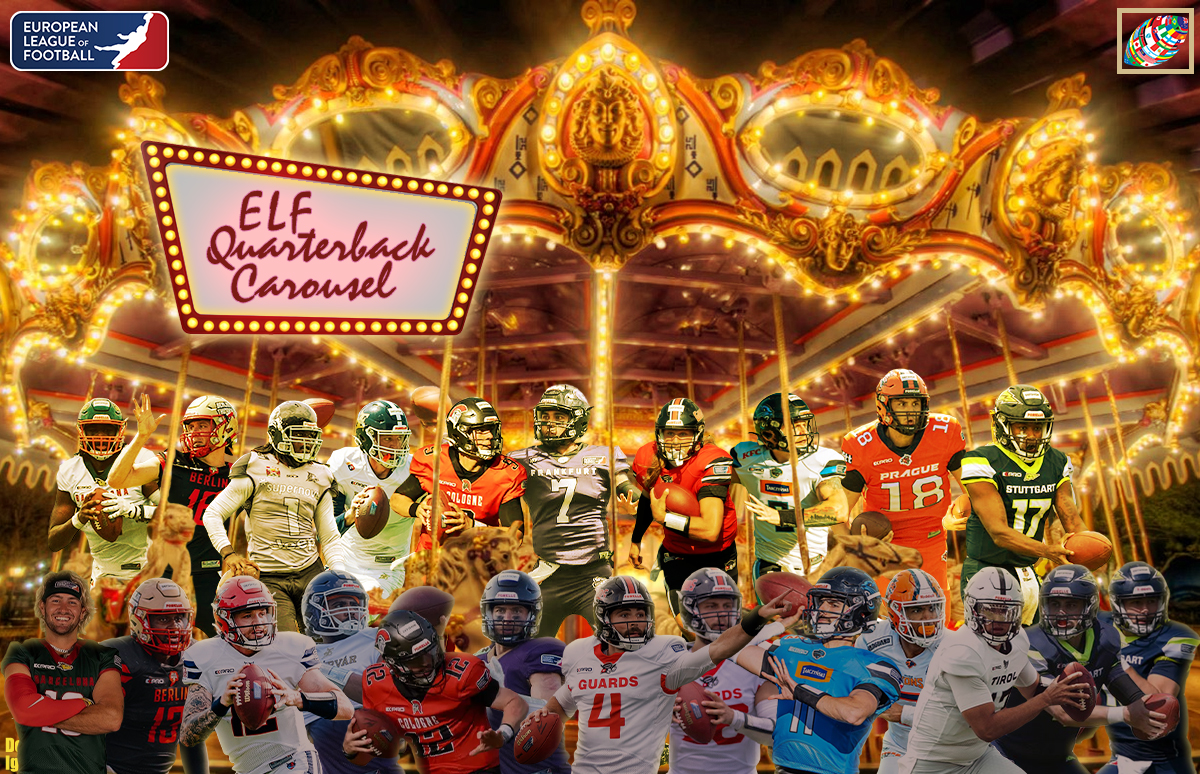Around and around we go. For the second year in a row, the European League of Football (ELF) is plowing through quarterbacks at a nauseating rate. Of the 16 teams currently in the league, 11 have changed quarterbacks at least once. It’s hard to think of another professional sport, anywhere around the world, where this level of turnover is normal.
Vienna Vikings – Chris Helbig
Rhein Fire – Jadrian Clarke
Berlin Thunder – Donovan Isom → Slade Jarman
Stuttgart Surge – Reilly Hennessey → Jan Weinreich → Kenyatte Allen
Wroclaw Panthers – Matthew Vitale → Makenzie Sexton
Hamburg Sea Devils – Preston Haire → Isaiah Green
Raiders Tirol – Christian Strong → ?
Prague Lions – Shazzon Mumphrey → Nate Cox → Brad Jones (?)
Fehervar Enthroners – Jerod Evans → Kevin Doyle Jr.
Cologne Centurions – Dylan Jacobs → Judd Erickson
Frankfurt Galaxy – Jakeb Sullivan → Steve Cluley
Helvetic Guards – Colin Hill → Jordan Barlow → Tristan Noble
Milano Seamen – Luke Zahradka
Munich Ravens – Chad Jeffries
Paris Musketeers – Zach Edwards
Barcelona Dragons – Conor Miller → Carlton Aiken Jr.
Of course, context is crucial here. About half of those changes were performance related, the rest were due to injury. But a freakish number of injuries to quarterbacks is still not okay and worth exploring.
Injury
This is not baseball or basketball where teams play 80+ games a season. We are in Week 8 and we’ve already seen a significant number of players lost to injury. One of the reasons for this is player safety.
In last week’s game against the Frankfurt Galaxy, Paris Musketeers quarterback Zach Edwards received three (that we witnessed) significant blows to the head that were not called.
As much as we love to see the refs letting the boys play, there needs to be a line. The NFL has taken what some would consider extreme measures to protect quarterbacks, but it has worked and there has been a dramatic decrease in injuries since. The ELF needs to do the same if they want teams to be more stable.
The other side to the injury coin is support teams. Just 10 quarterbacks in the NFL started all 17 games last year. But nearly all the injured ones came back within a few weeks. In the ELF there are only 12 games and each win is important. This is why teams are more willing to replace the ones they have if they can’t come back instantly.
As much as the ELF drapes itself in the cloak of professionalism, it is still miles behind the likes of the NFL and CFL in terms of sports injury prevention, rehab and care. This is nothing to blame the league for, money isn’t infinite and most players still have full time jobs. But a way to mitigate this is to protect the players on the field with tighter officiating.
Performance
The more interesting of the two reasons players are getting released is performance related. The culling of quarterbacks such as Dylan Jacob, Jerod Evans and Shazzon Mumphrey were expected after they failed to win any games. However, it could also easily be argued that they never really had much hope as their teams were ill-equipped for the level of competition.
But on the other end of the spectrum, we have the bewildering release of Raiders Tirol quarterback Christian Strong. What makes this release so interesting is that Strong currently ranks as the third best quarterback in the league (yards and touchdowns) and has led his team to a 6–2 record. The jury is still out on how this will impact the backend of the Raiders‘ season.
As mentioned before, context is crucial. And this seems to be something that general managers and head coaches are lacking. Many of the quarterbacks coming into the league have outstanding resumes, which is what got them the job in the first place. So, when they don’t succeed it is either that their supporting cast isn’t very good or the scheme that they have been asked to run doesn’t suit their play style – which should have been a consideration when scouting the quarterback.
In conclusion, there are myriad reasons as to why quarterbacks are dropping like flies. But at the end of the day, decision makers (stakeholders and on-field staff) feel that the quarterback is the fastest way to solve all their problems. And in a lot of instances, they’re right, but it shouldn’t take away from them trying to solve the rest of their problems, whether that be unrealistic expectations, schematic inefficiency or a shallow depth chart of domestic players.
